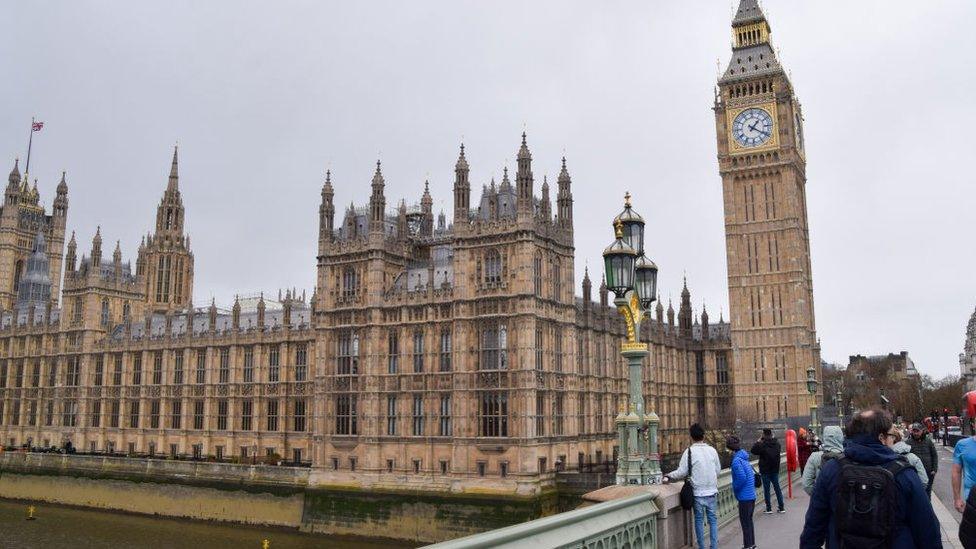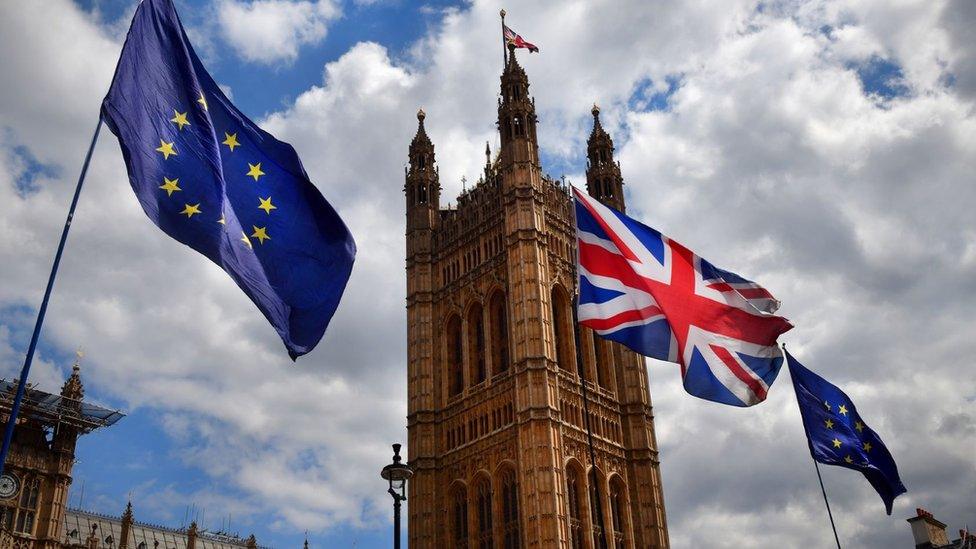What's happening in Parliament next week?
- Published

Parliament is back for a busy two weeks before it breaks again for a Coronation recess - a break which will also see a major set of local elections, covering much of England outside London and all of Northern Ireland.
As well as enjoying the pageantry, all the parties will be pondering whatever verdict the voters deliver; will they confirm the government's dire poll ratings, or will they provide ministers with some electoral hope?
In the chamber, MPs spend two days on the detail of the Finance Bill, the measure that enacts the changes announced by Jeremy Hunt in the Budget. The whole House debates are mostly focused on pensions and alcohol, with the remaining detailed debate consigned to a Public Bill Committee.
There's an interesting nerd issue here, because the government has, in effect, timetabled the Committee of the Whole House. Does that mean that the Public Bill Committee could invite witnesses to, for example, talk about the impact of alcohol tax changes?
Keep an eye on negotiations between ministers and backbench Conservative dissidents in advance of the report stage for the Illegal Migration Bill, which resurfaces on 25 April.
Judging by the committee stage debate, there is potential for a rebel amendment on exempting victims of modern slavery from instant removal from the UK, which could command backbench Conservative and official opposition support. So far the Sunak government has preferred to negotiate with rebels, rather than simply crush them.
Meanwhile in the Lords, where the government is still regularly losing votes, there are signs of serious trouble ahead.
The surprise postponement of the crucial report stage consideration of the hyper-controversial Retained EU Law Bill, which had originally been timetabled for Wednesday and the following Monday (the debates for those days have both been changed), suggests that the whips' sums have added up to defeat on this key piece of Brexit legislation.
This is the bill which sets a "sunset" date of the end of 2023 after which all remaining law inherited from the EU will lapse, and which gives ministers the power to rewrite such laws.
Many peers regard the sunset date as unrealistic, because the vast volume of law and regulation involved could not be properly reviewed, and believe ministers should not have such sweeping powers to rewrite them without scrutiny. So there's a meaty list of amendments extending the deadline to various later dates and proposing mechanisms to scrutinise changes in the law.
The amendment which looks to have forced postponement is proposed by crossbenchers Lord Hope and Lord Anderson, along with Conservatives Lord (Archie) Hamilton and Lord Hodgson. This would set up a joint committee of the Lords and Commons to sift through significant changes from the retained EU law.
It's the presence of Lord Hamilton - a Conservative and Brexiteer - that makes this interesting, and while the amendment has not been signed by any Labour or Lib Dem peers, thus sparing him any blushes over co-operation with the opposition, I bet they'd be happy to vote for it, if ministers have not found a way to defuse the situation before the bill is reintroduced.

The next stage of the Retained EU Law Bill has been postponed
Elsewhere on their Lordships' agenda, the backlog grows ever more daunting. The committee stage of the sprawling Levelling Up Bill has turned into a marathon - peers spent 90 long minutes discussing the rules for changing street names in one purgatorial sitting.
Originally scheduled for eight days, it grew to 10, and day 11 now looms on the advance business - which means perhaps six days of report stage consideration later.
Pile on top of that the Online Safety Bill (already assigned a whopping 11-day committee stage, and you can bet that too will expand), the Energy Bill, the Northern Ireland Legacy Bill, and the incoming Illegal Migration Bill, and the timetable looks very congested between now and the end of the session, generally expected to be in November.
Remember that the general rule is that any legislation not agreed by both Houses when the music stops, at prorogation, is lost, unless a carry-over motion has been agreed. So if the Commons and Lords are at loggerheads about any of these bills, come October, peers will have considerable leverage. It seems like a twiddly procedural point but it could mean important changes to the law.
One other piece of Lords news; Lord Judge, the convener of the crossbench, or independent, peers, has had to stand down for health reasons, which means an election for one of the four leadership posts at the top of the Lords system - although the convenor is not a party leader in the normal sense, because the crossbenchers are not a party, they're certainly a key influencer on the red benches.
Monday 17 April
Commons: (14:30) Education Questions, with any post-recess urgent questions or government statements following at 15:30.
Main debate: Second reading of the Data Protection and Digital Information Bill, which seeks to simplify and update the UK's data protection regime with the argument that the UK's version of the EU data protection system (GDPR) put unnecessary burdens on business.
Westminster Hall: (16:30) MPs debate e-petition 614335 which calls on the government not to sign any international treaty on pandemic prevention and preparedness established by the World Health Organization (WHO), without a public referendum. The government says that to protect lives, the economy and future generations from future pandemics, it supports a new legally-binding instrument to strengthen pandemic prevention.
Committees: Levelling Up, Housing and Communities (16:00) takes evidence from election administrators and campaigners, including the British Youth Council and Disability Rights UK, for its inquiry on electoral registration. Expect the potential impact of new voter ID requirements to come up.
Lords: (14:30) Energy Bill - Report (day 2 of 2).
Tuesday 18 April
Commons: (11:30) Energy Security and Net Zero Questions.
Ten Minute Rule Bill: Conservative Alexander Stafford wants those who have failed in a duty of care to prevent child abuse to be barred from holding any elected office or any post paid for by public money, to ban anyone convicted of child abuse from elected office and to strip any peer convicted of such an offence of their peerage. Mr Stafford is the MP for Rotherham and this clearly follows on from the town's long-running child abuse scandal.
Main debate: Committee consideration of the Finance Bill (see above).
Committees: Education (10:00) questions experts from universities and think tanks including the Institute for Fiscal Studies on childcare announcements in the Budget.
Lords: (14:30) Levelling-Up and Regeneration Bill - Committee (day 9 of 11).
Wednesday 19 April
Commons: (11:30) Wales Questions, followed, at noon, by Prime Minister's Question Time.
Ten minute rule bill: Conservative Anthony Mangnall wants to encourage landowners in Dartmoor National Park to allow more public access to their land.
Main debate: Day 2 of committee on the Finance Bill.
Westminster Hall: Former Chief Whip Wendy Morton leads a debate on food security and farming (11:00).
Committees: Home Affairs (10:15) hears from former High Court judge Baroness Butler-Sloss and former independent anti-slavery commissioner Dame Sara Thornton, as part of its inquiry into human trafficking in the UK.
Lords: (15:00) Online Safety Bill, the first of 10 days of detailed debate.
Thursday 20 April
Commons: (09:30) Transport Questions, followed by the weekly update on the forthcoming Commons agenda, from the leader of the House.
Main debate: Backbench debates on international trade and geopolitics, and on the human rights of the Palestinian people.
Westminster Hall: Former Scottish Secretary David Mundell leads a debate on the economic contribution of medicinal cannabis (15:00).
Committees: Public Accounts (10:00) has a session on improving mental health services, questioning leading officials at the Department of Health and Social Care, and NHS England.
Lords: (11:00) Peers open with a rapid third reading rubber-stamping of the Energy Bill, before moving on to day 10 of their committee stage debates on the Levelling Up and Regeneration Bill.
Friday 21 April
Thanks to the record numbers of private members' bills (laws proposed by individual MPs) passed by the Commons, the Lords has scheduled a series of extra sitting Fridays to debate them.
Lords: (10:00) Peers whistle through a series of private members' bill third readings: the Heritage Railways and Tramways (Voluntary Work) Bill; the Ecology Bill; the Employment (Allocation of Tips) Bill; and the Pension Dashboards (Prohibition of Indemnification) Bill.
Then come more substantial second reading debates on a new batch of private members' bills sent over from the Commons: the Electricity and Gas Transmission (Compensation) Bill; the Child Support Collection (Domestic Abuse) Bill; the Offenders (Day of Release from Detention) Bill; and the Supported Housing (Regulatory Oversight) Bill.
